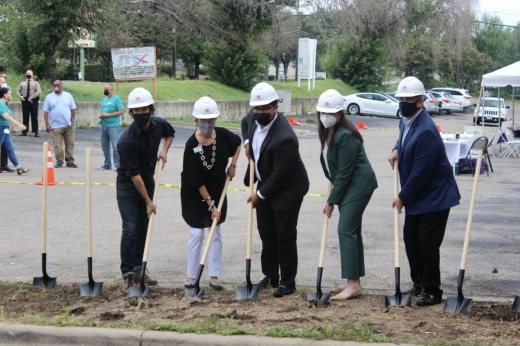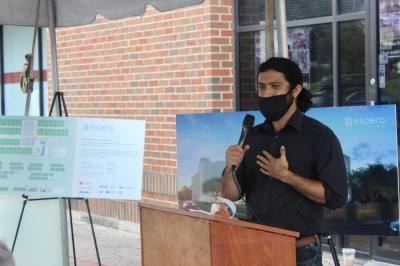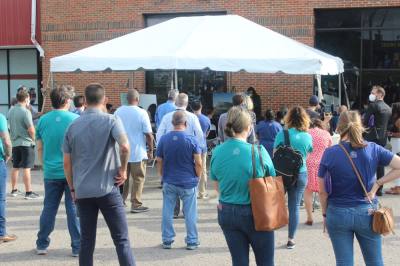Austin officials and community members gathered on Rutland Drive on Aug. 9 to highlight the groundbreaking of Espero Rutland, a permanent supportive housing complex for people experiencing homelessness expected to open late next year.
The 171-unit development to be located at 1934 Rutland Drive, Austin, came together over the past several years through collaboration among the city of Austin, its housing finance corporation, housing developer Vecino Group and homeless nonprofit Caritas of Austin. Following the August groundbreaking event, project development at the 2-acre North Austin site is expected to wrap up next fall.
City officials attending the ceremony spoke both to the outlook for future Espero Rutland residents and the project's place in Austin's overall homeless strategy. District 4 Council Member Greg Casar, whose district includes the housing project, said the Espero development could end up being a model to be repeated throughout the city as officials work to find housing for its thousands of homeless residents.
“So often when I talk to folks about addressing homelessness in our city, there’s a lack of hope. A feeling that the task is too large for us to handle, that it is a challenge that has been with us for too long and will always stay with us," Casar said. "I think this project shows us the hope that that is just not the case; that achieving a drastic reduction in homelessness in Austin is totally within our grasp.”
Mayor Steve Adler also pointed to Espero Rutland as an example of the possibilities of the city's homeless housing infrastructure. Once again voicing his support for Austin's Summit Plan to house 3,000 people experiencing homelessness by spring 2024—a strategy developed by city leaders, private partners and other community members through March and April that has tracked dozens of housings so far—he said the example of partnership on the North Austin project is one that could carry over to new developments across Austin.
"There’s obviously a lot of work to do to actually identify that plan and a lot of the logistics work, but first we need an indication from the community that it’s ready to participate with resources and that scale. And the reaction that we’re getting from possible funders or contributors or investors has been really positive, so I’m real encouraged," Adler said. "I think you’re going to see these things happening in different parts of the city. We need to have the opportunity for people to live in all parts of the city; they already do, it’s just that you don’t see them.”
The Rutland project will be the first housing initiative in the city from Caritas, which plans to offer personalized support and case management to all residents. The nonprofit's President and CEO Jo Kathryn Quinn said that despite challenges associated with such a project, Caritas staff will be available and plan to focus on patient, community-based service once Espero's doors open.
"Getting Espero to this point has been frustrating and exhausting," Quinn said. "Opening and operating will also be frustrating and exhausting, but we never give up on our clients."
The complex's 171 studio apartments will range in affordability from 30%-60% of the local median family income or below, and 51 will be dedicated to people with disabilities. Planned amenities at the Espero development include a community dining area, fitness and business centers, laundry rooms and an interior courtyard. Quinn said the closed yard may also be used by residents as a secured sleeping location, if they desire, as they transition to the complex's supportive housing environment.
“I have such high hope for the 171 lives that are going to be changed by this facility, by housing, by support and dignity and care to people in our community that are in such need," Adler said.
The facility is co-owned by the city and Austin Housing Finance Corp. as well as Caritas and Vecino, a national developer focused on projects that meet a community need. The project's launch is supported by several funding sources such as $7.5 million in city and Austin Housing Finance Corp. bonds for the site purchase in addition to Texas Department of Housing and Community Affairs housing tax credits, city vouchers and additional backing from Aetna, Austin Public Health, Citi Community Capital and the city housing authority. Caritas estimates total construction costs for the project at $34 million.







